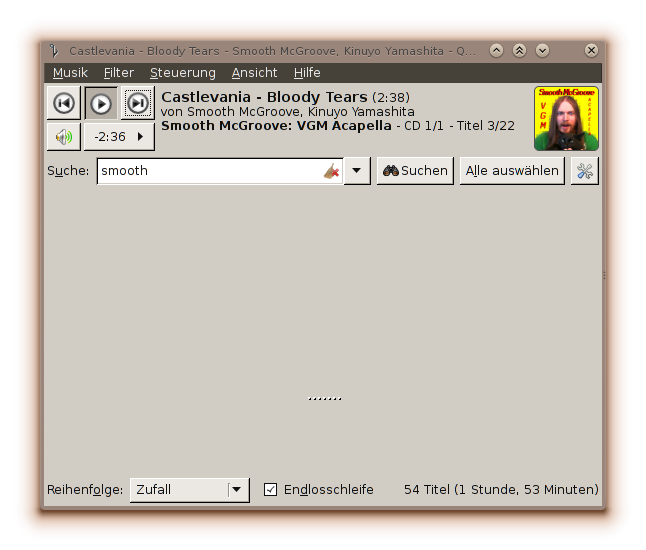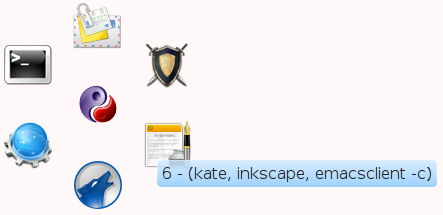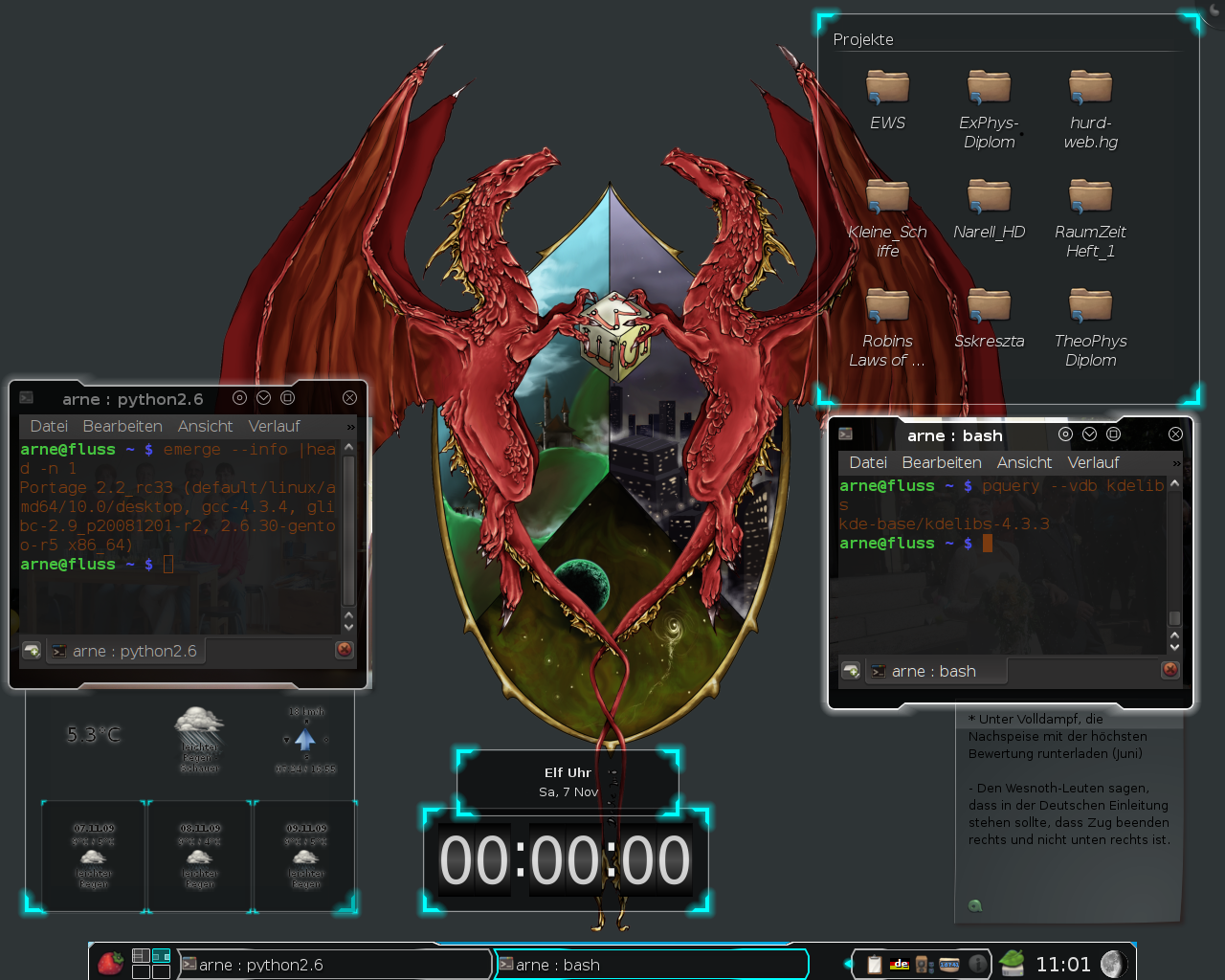Gentoo
I finally got the Freenet junit testsuite to run on Gentoo
Sa, 04/02/2016 - 14:10 — DraketoFor years I developed Freenet partially blindfolded, because I could not get the tests to actually run on my Gentoo box.
As of today, that’s finally over: The testsuite runs successfully. My setup is still unclean, but it finally works. No more asking other contributors to run the tests for me.
To reproduce:
-
The image of the blindfolded dog (original size) is from Takuma Kimura (photones), published on Flickr under CreativeCommons attribution sharealike (by-sa). ↩
- Login to post comments
- Weiterlesen
Simple daemon with start-stop-daemon and runit
Mi, 04/15/2015 - 07:08 — DraketoCreating a daemon with almost zero effort.
Table of Contents
- Login to post comments
- Weiterlesen
How to fix a bug, using the example of Quod Libet empty panes on Gentoo GNU/Linux (bug solving process)
Mi, 12/11/2013 - 21:29 — DraketoPDF-version (for printing)
orgmode-version (for editing)
For a few days now my Quod Libet has been broken, showing only empty space instead of information panes.

I investigated halfheartedly, but did not find the cause with quick googling. Today I decided to change that. I document my path here, because I did not yet write about how I actually tackle problems like these - and I think I would have profited from having a writeup like this when I started, instead of having to learn it by trial-and-error.
Update: Quodlibet 2.6.3 is now in the Gentoo portage tree - using my ebuild. The update works seamlessly. So to get your Quodlibet 2.5 running again, just call
emerge =media-sound/quodlibet-2.6.3 =media-plugins/quodlibet-plugins-2.6.3. Happy Hacking!Update: I got a second reply in the bug tracker which solved the plugins problem: I had user-plugins which require Quod Libet 3. Solution:
mv ~/.quodlibet/plugins ~/.quodlibet/plugins.for-ql3. Quod Libet works completely again.Solution for the impatient: Update to Quod Libet 2.5.1. In Gentoo that’s easy.
- Login to post comments
- Weiterlesen
Top 5 systemd troubles - a strategic view for distros
Mi, 11/20/2013 - 18:42 — Draketosystemd is a new way to start a Linux-system with the expressed goal of rethinking all of init. These are my top 5 gripes with it. (»skip the updates«)
Update (2019): I now use GNU Guix with shepherd. That’s one more better option than systemd. In that it joins OpenRC and many others.
Update (2016-09-28): Systemd is an exploit kit just waiting to be activated. And once it is active, only those who wrote it will be able to defuse it — and check whether it is defused. And it is starting: How to crash systemd in one tweet? Alternatives? Use OpenRC for system services. That’s simple and fast and full-featured with minimal fuss. Use runit for process supervision of user-services and system-services alike.
Update (2014-12-11): One more deconstruction of the strategies around systemd: systemd: Assumptions, Bullying, Consent. It shows that the attitude which forms the root of the dangers of systemd is even visible in its very source code.
Update (2014-11-19): The Debian General Resolution resulted in “We do not need a general resolution to decide systemd”. The vote page provides detailed results and statistics. Ian Jackson resigned from the Technical Committee: “And, speaking personally, I am exhausted.”
Update (2014-10-16): There is now a vote on a General Resolution in Debian for preserving the ability to switch init systems. It is linked under “Are there better solutions […]?” on the site Shall we fork Debian™? :^|.
Update (2014-10-07): Lennart hetzt (german) describes the rhetoric tricks used by Lennart Poettering to make people forget that he is a major part of the communication problems we’re facing at times - and to hide valid technical, practical, pragmatical, political und strategical criticism of Systemd.
Update (2014-09-24): boycott systemd calls for action with 12 reasons against systemd: “We do recognize the need for a new init system in the 21st century, but systemd is not it.”
Update (2014-04-03): And now we have Julian Assange warning about NSA control over Debian, Theodore Ts’o, maintainer of ext4, complaining about incomprehensible systemd, and Linus Torvalds (you know him, right?) rant against disrupting behavior from systemd developers, going as far as refusing to merge anything from the developers in question into Linux. Should I say “I said so”? Maybe not. After all, I came pretty late. Others saw this trend 2 years before I even knew about systemd. Can we really assume that there won’t be intentional disruption? Maybe I should look for solutions. It could be a good idea to start having community-paid developers.
Update (2014-02-18): An email to the mailing list of the technical committee of debian summarized the strategic implications of systemd-adoption for Debian and RedHat. It was called conspiracy theory right away, but the gains for RedHat are obvious: RedHat would be dumb not to try this. And only a fool trusts a company. Even the best company has to put money before ethics.
Update (2013-11-20): Further reading shows that people have been giving arguments from my list since 2011, and they got answers in the range of “anything short of systemd is dumb”, “this cannot work” (while OpenRC clearly shows that it works well), requests for implementation details without justification and insults and further insults; but the arguments stayed valid for the last 2 years. That does not look like systemd has a friendly community - or is healthy for distributions adopting it. Also an OpenRC developer wrote the best rebuttal of systemd propaganda I read so far: “Alternativlos”: Systemd propaganda (note, though, that I am biased against systemd due to problems I had in the past with udev kernel-dependencies)
- Login to post comments
- Weiterlesen
pyRad is now in Gentoo portage! *happy*
Mo, 07/18/2011 - 08:12 — DraketoMy wheel type command interface pyRad just got included in the official Gentoo portage-tree!
So now you can install it in Gentoo with a simple emerge kde-misc/pyrad.
- Login to post comments
- Weiterlesen
KDE 4.5 rc1 Bildschirmfoto mit Infos zum Selbermachen
Mi, 06/30/2010 - 21:25 — DraketoUnd mal wieder ist es Zeit für einen Screenshot, diesmal von KDE SC 4.5 release candidate 1:
Klick einfach auf das Bild, um es in voller Größe und Schönheit zu sehen :)
Im Gegensatz zu meinem Screenshot von KDE 4.3.3 nutze ich diesmal fast nur Standardeinstellungen, weil ich wieder stärker sehen will, wie sich das Standard-KDE entwickelt.
- Login to post comments
- Weiterlesen
pkgcore vs. eix → pix (find packages in Gentoo)
Fr, 06/25/2010 - 22:18 — DraketoFor a long time it bugged me, that eix uses a seperate database which I need to keep up to date. But no longer: With pkgcore as fast as it is today, I set up pquery to replace eix.
The result is pix:
alias pix='pquery --raw -nv --attr=keywords'
(put the above in your ~/.bashrc)
The output looks like this:
$ pix pkgcore
* sys-apps/pkgcore
versions: 0.5.11.6 0.5.11.7
installed: 0.5.11.7
repo: gentoo
description: pkgcore package manager
homepage: http://www.pkgcore.org
keywords: ~alpha ~amd64 ~arm ~hppa ~ia64 ~ppc ~ppc64 ~s390 ~sh ~sparc ~x86
- Login to post comments
- Weiterlesen
KDM (Login) Tastaturlayout auf Neo umstellen
Di, 01/19/2010 - 08:50 — DraketoIch habe mein Haupt-Tastaturlayout auf Neo umgestellt und die Tastatur umgebaut. Da ich etwas suchen musste, bis ich herausgefunden habe, wie ich es auch in KDM das Neo-Layout nutzen kann, schreibe ich es hier.
Damit das hier funktioniert, musst du "evdev" als Tastaturtreiber nutzen.
Als ersten Schritt muss eine Tastaturlayout-Dateien in /etc/hal/fdi/policy/ sein. Wenn da keine keymapfdi Datei liegt, kopier dazu einfach den folgenden Befehl in die Konsole:
- Login to post comments
- Weiterlesen
Automatic updates in Gentoo GNU/Linux
Di, 01/12/2010 - 07:48 — DraketoUpdate 2016: I nowadays just use
emerge --sync; emerge @security
To keep my Gentoo up to date, I use daily and weekly update scripts which also always run revdep-rebuild after the saturday night update :)
My daily update is via pkgcore to pull in all important security updates:
pmerge @glsa
That pulls in the Gentoo Linux Security Advisories - important updates with mostly short compile time. (You need pkgcore for that: "emerge pkgcore")
Also I use two cron scripts.
- Login to post comments
- Weiterlesen
Automatische Aktualisierungen in Gentoo GNU/Linux
Di, 01/12/2010 - 07:48 — DraketoUm mein Gentoo mit minimalem Wartungsaufwand aktuell zu halten verwende ich tägliche und wöchentliche Cron-Scripte.
Das tägliche Update läuft über pkgcore, um wichtige Sicherheitsupdates zu installieren:
pmerge @glsa
Damit installiert mein Rechner die Gentoo Linux Security Advisories, d.h. die wichtigsten Sicherheitsupdates (Damit das Script läuft brauchst du pkgcore: "emerge pkgcore")
- Login to post comments
- Weiterlesen
KDE 4.3.3
Fr, 11/06/2009 - 22:19 — DraketoIch dachte, es wäre mal wieder an der Zeit für einen aktuellen Screenshot:
Klick einfach auf das Bild, um es in voller Größe und Schönheit zu sehen :)
Was ich nutze:
- Login to post comments
- Weiterlesen
For me, Gentoo is about *convenient* choice
Fr, 10/02/2009 - 10:23 — DraketoIt's often said, that Gentoo is all about choice, but that doesn't quite fit what it is for me.
After all, the highest ability to choose is Linux from scratch and I can have any amount of choice in every distribution by just going deep enough (and investing enough time).
What really distinguishes Gentoo for me is that it makes it convenient to choose.
Since we all have a limited time budget, many of us only have real freedom to choose, because we use Gentoo which makes it possible to choose with the distribution-tools.
- Login to post comments
- Weiterlesen
Gentoo live ebuild for Mercurial
Mi, 03/11/2009 - 08:20 — DraketoWe (nelchael and me) just finished a live ebuild for Mercurial which allows to conveniently track the main (mpm) repo of Mercurial in Gentoo.
To use the ebuild, just add
=dev-util/mercurial-9999 **
to your package.keywords and emerge mercurial (again).
- Login to post comments
- Weiterlesen
Gentoo auf iMac Flat-Screen 1,25Ghz
Do, 11/06/2008 - 07:26 — DraketoIch habe gestern die Installation von Gentoo auf dem iMac meiner Frau begonnen.
Gestern habe ich die 2008.0 Universal-CD gebrannt und den iMac damit gebootet, die letzten 15 Minuten habe ich damit zugebracht, den "Gentoo" Eintrag auf meiner Seite zu schreiben, also sind wir gerade bei etwa
T=30 Minuten
Der tar-ball ist ausgepackt. Ich formatiere die Platten nicht neu - vielleicht kann ich so die Daten aus Kubuntu erhalten (ja, ich habe ein Backup der wichtigen Daten). update: Hat geklappt. Alle Daten sind noch da.
- Login to post comments
- Weiterlesen
Gentoo
Do, 11/06/2008 - 07:20 — DraketoGentoo ist die GNU/Linux Distribution meiner Wahl: http://gentoo.org
Es gibt mir Flexibilität, installiert aus den Quellen und seine Paketverwaltung (Portage) baut auf Python auf.
Und es hat mich noch nie so kalt erwischt wie das ppc Kubuntu das ich meiner Frau installiert habe ("da muss man nicht dran rumbasteln"), das ich gerade nach dem zweiten dist-upgrade Komplettcrash (mit jeweils 4-6 Stunden Aufwand um es wieder zum Laufen zu bringen) durch ein Gentoo ersetze (das im Gegensatz zu meinem nicht auf Spielereien sondern auf Stabilität gebaut wird).
- Login to post comments
(All this is) Gentoo for me
Fr, 10/31/2008 - 20:55 — Draketo - Words and Music: Arne Babenhauserheide ( http://draketo.de )
- Words and Music: Arne Babenhauserheide ( http://draketo.de )
Listen to the song: ogg
This recording is part of the music podcast singing in the winds of time.
Refrain:
I build my kernel and I strip it down,
my programs only do what I need
the tree is at my very core
it's my whole world and it is my seed.
- Login to post comments
- Weiterlesen
hp photosmart druckt nicht mehr - communication problem: lpr 256
Do, 09/04/2008 - 13:11 — DraketoUpdate: Diese Lösung hat mein Problem kurzfristig gefixt - nach einer Weile hatte ich wieder Probleme. Inzwischen habe ich mein System neu aufgesetzt und er läuft wieder.
Ich habe gerade Stunden damit zugebracht, meinen Drucker endlich wieder zum Laufen zu bringen.
Die Lösung war:
cd /dev/bus/usb
chmod o+w */*
ACHTUNG: UNSICHER!
Diese Lösung gibt jedem Nutzer im System Schreibrechte auf die USB-Geräte. Auf keinen Fall auf einem System mit nicht-vertrauenswürdigen Nutzern machen.
Hintergrund:
Probleme:
- Login to post comments
- Weiterlesen
KDE in Gentoo
Fr, 05/30/2008 - 00:26 — DraketoHier finden sich Sachen zu KDE in Gentoo.
update: kdelibs 4.3.1 sind jetzt amd64 stable. Damit ist KDE 4.3 die Standard-KDE-Version in Gentoo.
-> http://gentoo-portage.com/kde-base/kdelibs
Inzwischen ist KDE 4.1 im portage tree.
-> http://forums.gentoo.org/viewtopic-t-708282.html
In den Gentoo Foren:
- Login to post comments
- Weiterlesen
Endlich frei! - Freier radeonhd Treiber für meine ATI Karte
Mo, 02/25/2008 - 10:35 — DraketoIch habe heute mein X auf den freien radeonhd treiber umgestellt, und damit bin ich nun endlich wirklich frei!
Das muss natürlich heißen: Mein Computer nutzt nun nur noch freie Software, nachdem ich endlich die unfreien Graphikkartentreiber rausschmeißen konnte.
Ich hatte leider eine ATI X1300 Karte, die vom alten freien Radeon Treiber nicht unterstützt war.





